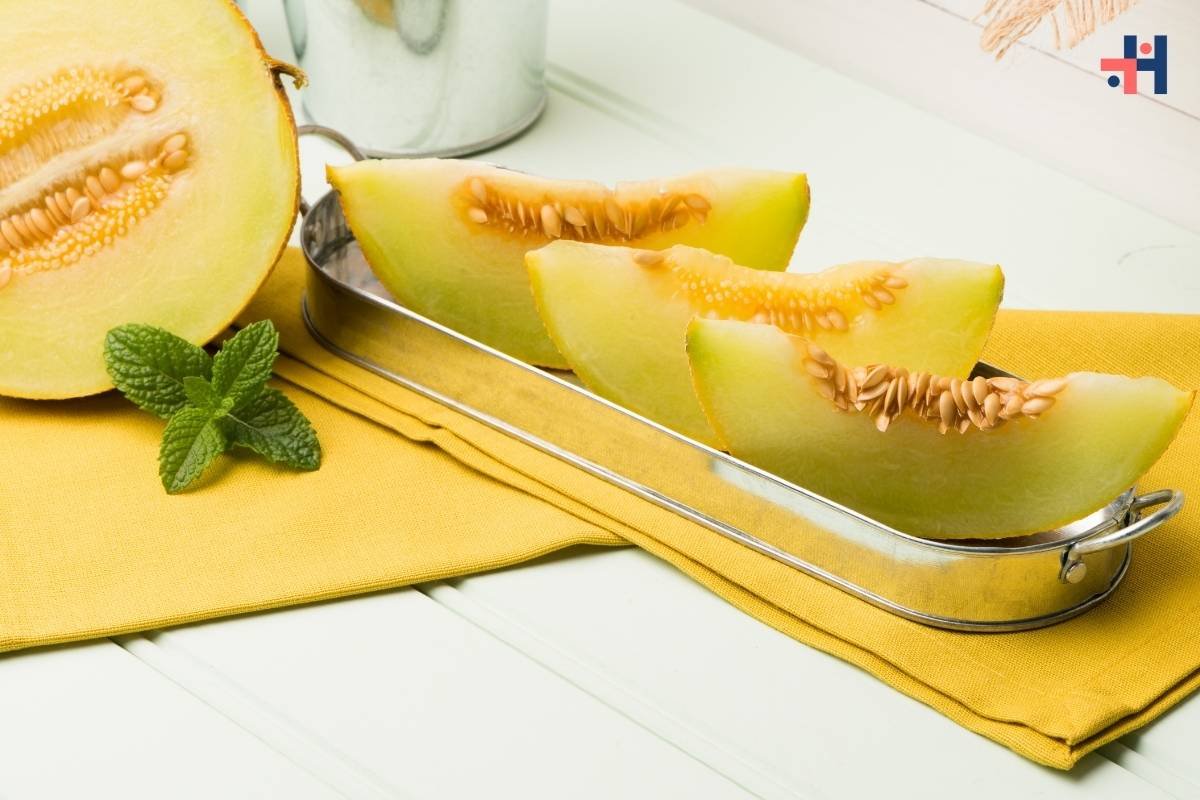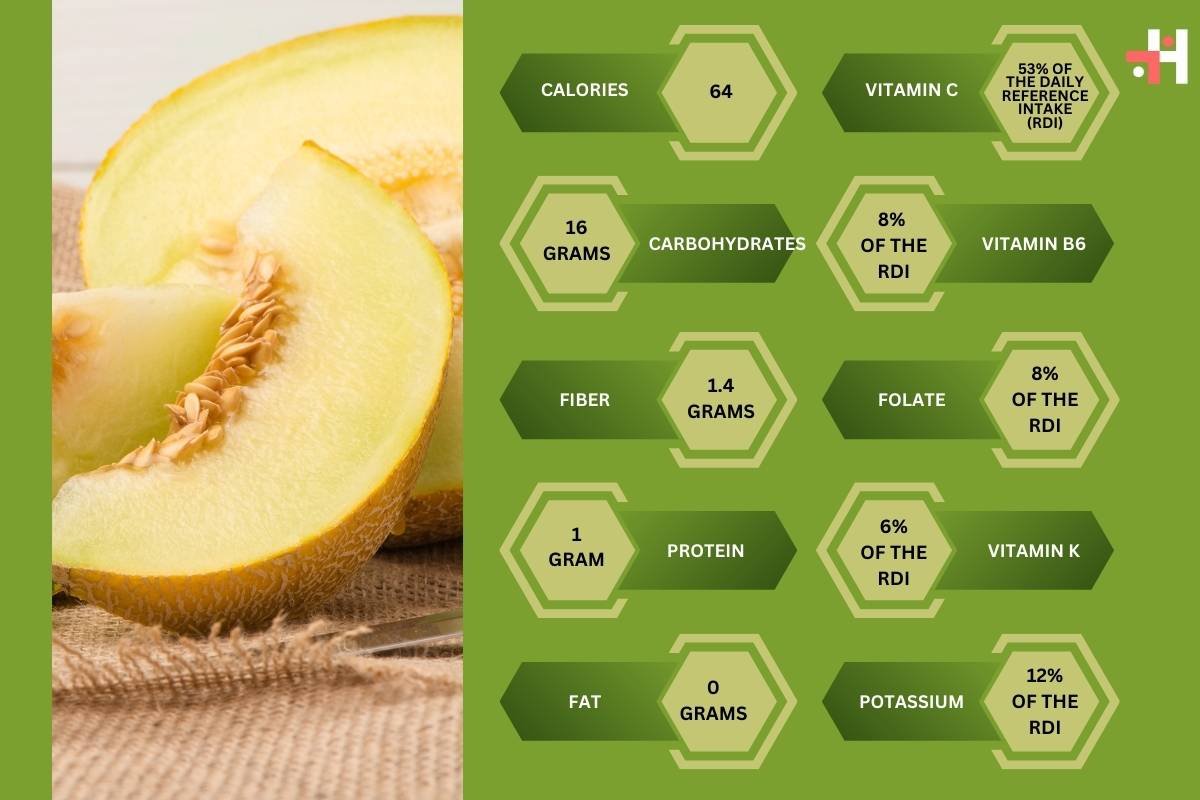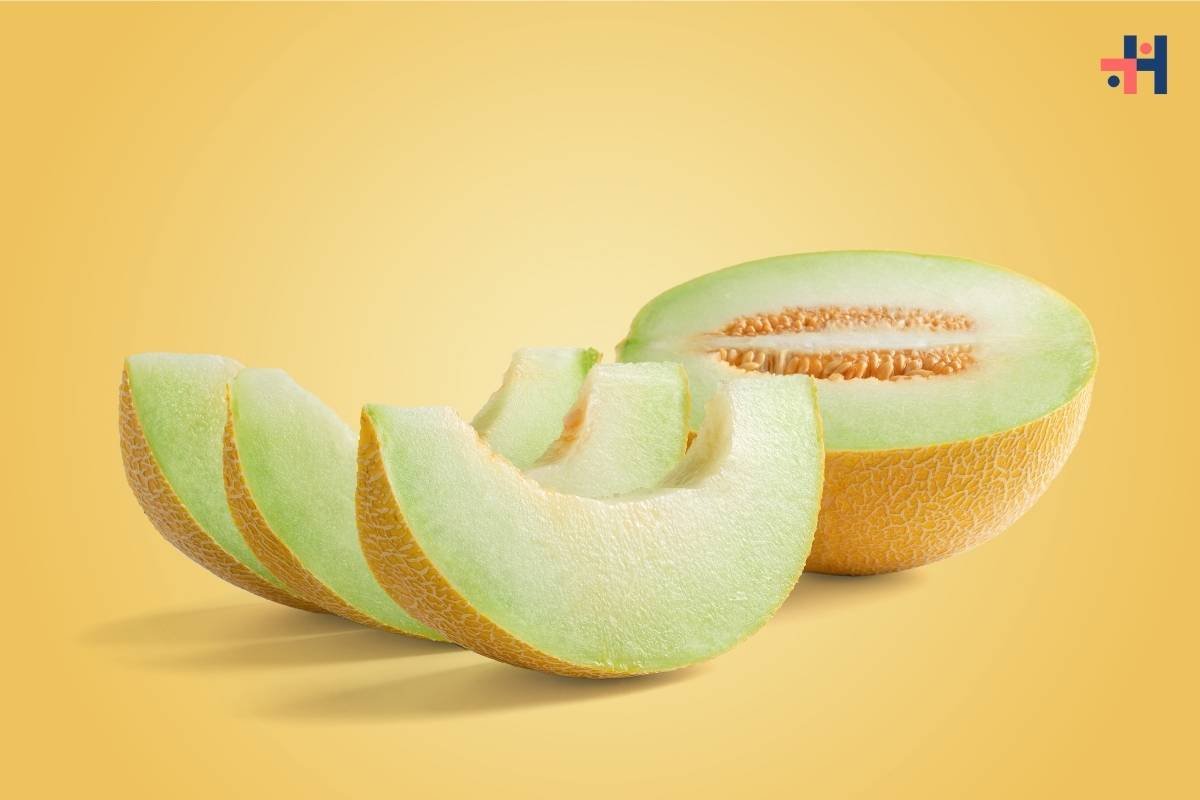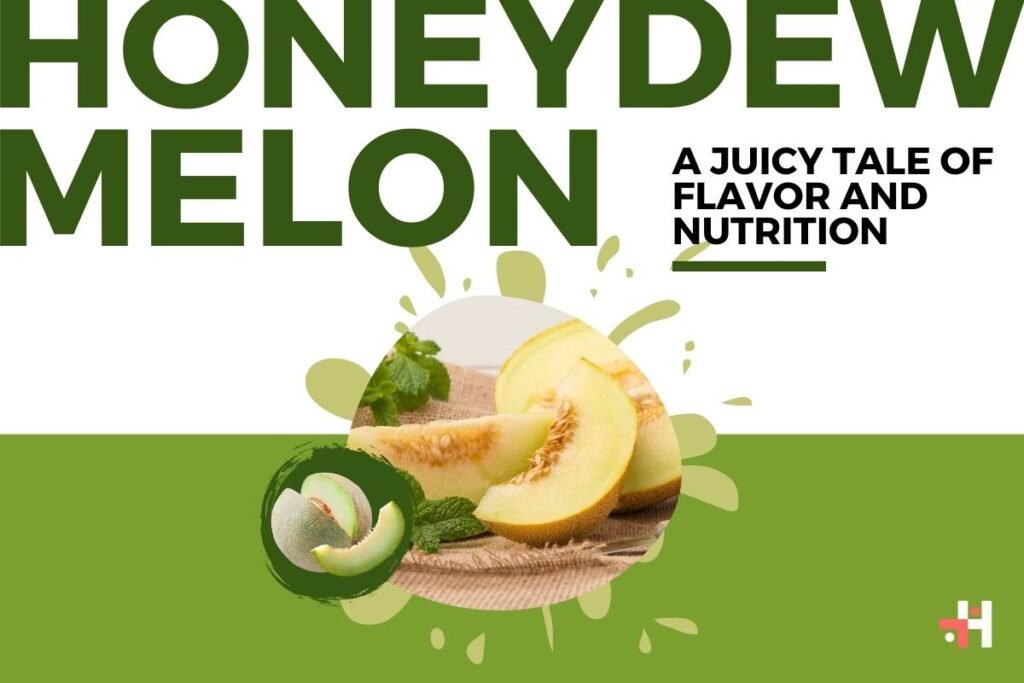“A flower supple like a baby’s skin, a fruit, a melon, free of sin.
A flavor sweet and quiet too, oh how I crave my honeydew.”
Belonging to the melon species Cucumis, honeydew melon is often overshadowed by its flashier cousins – cantaloupe and casaba. However, due to its beneficial plant elements, like fiber and carotenoids, honey melon surpasses all of its relatives.
It is a winter fruit with whitish-yellow skin and pale green flesh that is delicious and fragrant. Widely used in sweet, and savory dishes, honey melon finds its way into many kitchens throughout the world.
Fun fact: Honey melons contain about 90% water—a tasty way to be hydrated.
Table of Content
| History of Honeydew Melon |
| Honeydew Melon Nutrition Facts |
| Honeydew Melon Benefits |
| Adding Honeydew to the Diet |
| Honeydew Melon vs. Cantaloupe |
History of Honeydew Melon and its Colorful Past

Honey melons are like those fascinating travelers on the road — full of stories and surprises.
It is hard to pinpoint its exact origin as some believe they hail from North Africa, Western Asia, or maybe even West Africa. However, there is evidence of honeydew melon in ancient Egyptian tombs from 2400 BCE. From there, these melons traveled to Europe by way of Spain and eventually ended up in America. Over time, Turkey, china, and the US made honeydew a global citizen through their major production.
Honeydew by Any Other Name…
With so much travel comes a collection of cool nicknames. Here are a few of them.
- White Antibes: A French-Algerian term with a touch of sophistication.
- Wallace: Named after Henry A. Wallace, a US Secretary of Agriculture.
- Balian: The sweet and simple Chinese name for honeydew.
- Hmazli: A unique name given by the Mizo people.
- Chindire: The honeydew term used by the Chakma people of the Chittagong hill tracts.
So next time you bite into a honeydew melon, remember – it’s a world traveler with great stories to tell.
Honeydew Melon Nutrition Facts
One cup of honey melon contains the following.

Honey melons are also loaded with other vital vitamins, minerals, and health-boosting compounds.
Honeydew Melon Benefits: A Juicy Ally for Health
Honey melons can help feeling your best with its potential health benefits. Following are a few amazing honeydew melon benefits:
- Blood Pressure Relief: Low in sodium and high in potassium, a honey melon is a winning combo for healthy blood pressure. Furthermore, potassium also acts as a bouncer of the cells, letting the good stuff (nutrients) in and kicking out the bad (excess sodium).
- Strong Bones: Honeydew melon is a treasure of nutrients like magnesium, vitamin K, and folate. These help us keep our bones strong, especially as we age.
- Defense for Diabetes: Honey melon helps us slow down digestion and prevent blood sugar spikes. With a good amount of fiber, it can help manage diabetes and lower the risk of type 2 diabetes.
- Hydration: From regulating temperature to flushing out toxins, Honey melon is best to keep our body hydrated.
- Glowing Skin: Honeydew melon contains a good dose of vitamin C, which helps in keeping the skin healthy. Vitamin C assists in the production of collagen, a protein that keeps the skin wrinkle-free. It also acts as an Antioxidant, protecting the skin from premature aging and sun damage.
- Strong Immune System: That Vitamin C also strengthens our immune system, helping us fight the common cold and the flu. A strong immune system can even mean faster recovery times when we get sick.
- Better Digestion: Its fibers help move things smoothly in our digestive system, along with promoting a healthy gut by increasing the good bacteria.
- Sharper Vision: Honeydew melon has lutein and zeaxanthin, two important antioxidants for eye health. These antioxidants keep the eyesight sharp and protect from any age-related vision problem.
Remember, while research shows promise, more studies are needed to confirm all the potential benefits of honeydew melon. However, one thing’s for sure – adding this juicy fruit to our diet is a great way to support our overall health.
Adding Honeydew to the Diet
Honeydew melons — sunshine in fruit form with its refreshing, sweet, and oh-so-versatile qualities. Here are some healthy and delicious ways to incorporate it into your diet:
- Fruit Salad: Dice up and toss some honeydew with your favorite fruits for a colorful and healthy salad.
- Smoothie: Blend honeydew with fruits, veggies, and yogurt for a vitamin-packed honeydew melon smoothie, perfect for a quick snack or filling breakfast.
- Dessert: Don’t limit honeydew to just a fruit bowl. We can add it to pies, cakes, or tarts for unique and flavorful classic desserts.
- Savory Surprise: Chop and add honeydew to salsas or sauces for a refreshing twist. It pairs surprisingly well with seafood, chicken, or grilled veggies.

Also Read: Overcoming Apiphobia: Understanding and Conquering the Phobia of Bees
Honeydew Melon vs. Cantaloupe
These summer melons may be cousins (both belonging to the Cucumis melo species), but they have distinct personalities. Let’s dive into the juicy details!
- Vitamin Powerhouse: Cantaloupe takes the crown for vitamins A and C, offering a slight edge in the nutrient department. Both melons are champions of hydration – packed with fiber, potassium, and other essential vitamins. They’re practically twins when it comes to calorie and water content.
- Looks that Tell a Tale: Honeydew boasts a smooth, pale green exterior with flesh that matches its name. Cantaloupe, on the other hand, stuns with a netted, darker rind and vibrant orange insides. This difference in skin thickness also impacts their shelf life. Honeydew has a talent for hanging out longer, staying fresh for up to two weeks in the fridge (once cut). Cantaloupe enjoys a shorter fridge staycation, lasting about five days after slicing.
- Sweet Showdown: Honeydew leans towards the sweeter side, offering a gentle sweetness with a hint of floral notes. Cantaloupe boasts a more robust flavor profile, described as musky and slightly less sweet.
The Verdict?
Both melons bring deliciousness and essential nutrients to the table. Whether you crave a touch of floral sweetness (honeydew) or a more robust flavor (cantaloupe), there’s a perfect melon – waiting to be enjoyed.
Conclusion:
Honeydew melon is more than just a fleeting summer delight, it is a historical treasure trove brimming with nutrition. Packed with vitamins and boasting a lineage that stretches back centuries, this versatile melon deserves a spot on your plate. Enjoy it solo for a burst of sweet, refreshing flavor, blend it into a smoothie for an on-the-go power drink, or get adventurous and incorporate it into savory dishes. Honeydew’s subtle elegance makes it a true gem in the fruit world, so next time you crave something refreshing, reach for this underappreciated wonder.


No comments yet